How Empty Homes are Pricing Out Local People

Did you know that there are around 600,000 empty properties in the UK? This is around three times more than the official homelessness figure. It doesn’t take a genius to work out that something is seriously wrong.
Squatting is not really the answer, as it doesn’t give stable homes to people that live there, and often costs tens of thousands of pounds in repairs to property owners, who often then hand them over to property guardian companies, that rent them out cheaply to tenants, rather than leave them empty.

You Spot Property rewards you for spotting empty properties. If it meets their criteria, you get a £20 voucher. And if they sell it, you receive 1% of the property price (capped at £10k).
If you see a derelict eyesore, just take a photo and send it to them with the address. For each property sold, the company donates £500 to a local charity too.
My sister mentioned this website to me. I have now received 2 vouchers for M & S. And continue to walk around with my eyes wide open. Anything that looks a bit scruffy is being reported. Who knows, I might even do this full-time. Top idea! Mrs Charles
Action on Empty Homes says the nearer figure is 1 million, if you include holiday homes. It works to retrofit empty homes so they provide affordable accommodation to those that need homes, rather than bulldoze green spaces, to build new ones. You can report empty homes to them.
Why Are Properties in England Left Empty?
You might wonder why so many homes stand unused when people need shelter. The reasons are rarely simple.
- Absentee owners: Sometimes overseas investors buy properties and leave them idle, waiting for prices to rise.
- Inheritance issues: Families caught up in legal disputes may leave homes untouched for years.
- Speculation: Owners keep properties empty, hoping to sell when the market peaks. The house becomes more like a lottery ticket, than a home.
- Disrepair: Major fix-ups can be expensive. When repairs seem unaffordable, owners might give up altogether.
These factors trap useful homes in limbo, while neighbourhoods miss out on new neighbours and fresh energy.
Impact of Empty Properties on Communities
Vacant properties don’t just blend into the background. They often stick out for all the wrong reasons.
- Antisocial behaviour: Unwatched homes attract vandalism, squatting, and other issues that worry neighbours.
- Visual blight: Broken windows, graffiti, and overgrown gardens can quickly signal that no one cares.
- Falling property values: Nearby homes usually lose value, as the street’s reputation declines.
The ripple effect can damage more than just bricks and mortar. It hurts the sense of community and personal safety.
Councils are Now Taxing Empty Homes
The Derbyshire market town of Bolsover is one of the first to bring in an ’empty home tax’, to discourage people from buying second homes that sit empty most of the year.
Owners will have to pay far more than the single council rate if homes are not occupied for over a year. This law won’t apply say to the Armed Forces, who may have to leave homes empty, while abroad.
There are enough empty homes in the wealthy county of Surrey, to house all its homeless people five times over.
Seaside Resorts That Price Out Locals

Many popular seaside resorts like St Ives in Cornwall have effectively priced out local people, from buying their own homes. Rich second-home-owners buy up properties for a week or two surfing each year, then return to London, and leave the properties empty all year.
The prices rise due to more luxurious properties, and local people then can’t afford to buy.
In the affluent Devon seaside town of Salcombe, developers are planning to build £1 million homes, then promise to give the council money to build ‘affordable homes’ elsewhere.
One local councillor says ‘This is creating an artificial community. It has all the yachts bobbing in the sea, but no local people on the ground to keep the town alive’.
Some councils are now fighting back, doubling council tax on second home owners. But that likely won’t make much difference to people with huge amounts of money to pay it.
Also the present law means that many holiday let owners claim 100% tax relief, if they pay business rates (rather than council tax).






